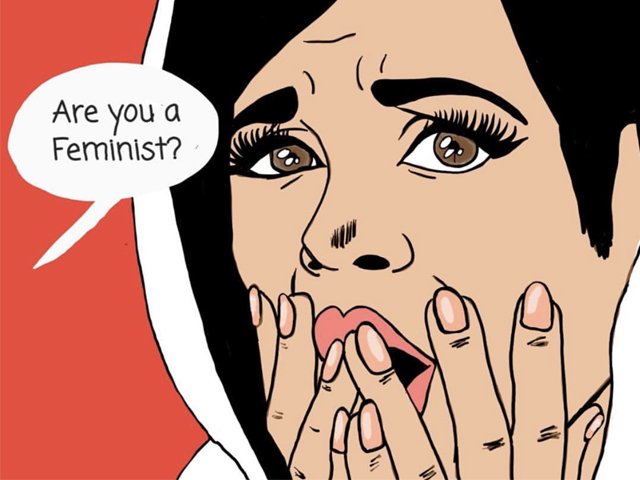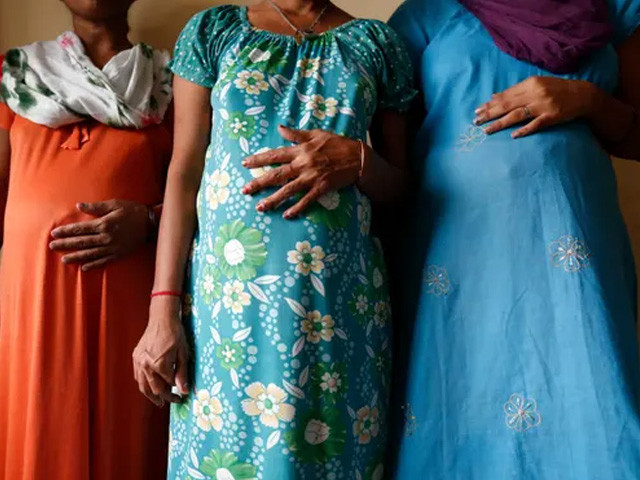
Just because I look at the world through a feminist lens does not mean I am a lesbian. PHOTO: THE PAKISTANI MARTHA STEWART
My feminism does not teach me to hate men
My feminism does not only mean I work to end oppression of women, or that I want to put women in charge instead of men
I was waiting to board a bus to Boston to attend a Model United Nations (MUN) conference, when one of my fellow teammates enquired about my undergraduate major. I excitedly and proudly exclaimed,
“Gender, sexuality and women’s studies!”
Considering that I was the only women’s studies major among the many political science majors, I took pride in that little piece of diversity that set me apart from the rest.
Surprised at my response, she asked me,
“On a scale of one to 10, how big of a feminist are you?”
Assuming that she was joking, I let out a laugh, until I saw a serious expression on her face – she was expecting a serious answer! In that moment, I realised that I did not have a way to measure the extent of my “feminist thinking” on a scale of one to 10. What I did have, however, was the ability to explain what I considered to be my feminism, and how it affected my everyday life and provided a lens for me to see the world around me.
This is what I told her. Feminism is a broad term – it can mean many things in many different contexts.
When I started off with my women’s studies major, I did not know what I was going to learn from it. As time passed, I learnt the many different dimensions of feminism – some I disagreed with, others I embraced. Through my life in university as a young woman, I experienced the privilege of forming a sense of identity and a relationship with feminism, which not only allows me to accept who I am but also defines my interests.
My feminism allows for my intersectional identity as a young South Asian woman in the West, and gives me the opportunity to meet many like myself. This allows people who are essentially different to find a middle ground and have a conversation about the global commonalities in the struggle of women. However, despite these commonalities, my feminism also allows space for disagreements, which ultimately helps me broaden my knowledge.
My feminism does not teach me to hate men. Rather, it challenges me to analyse the deeper and systematic systems of oppression embedded within our society; a system which favours certain people over others in order to maintain a hierarchy. It urges me to pass on what I have learnt about fighting the patriarchy, which maintains this hierarchy and categorises males as the superior beings.
Just because I look at the world through a feminist lens does not mean I am a lesbian. However, my feminism allows me to be accepting of people from every part of the spectrum of sexual orientation. It teaches me to make future generations more aware of the kind of language being used in everyday life so that they do not discriminate, whether intentionally or not. Moreover, it teaches me to be appreciative of the work done by women before me to gain a standing in the world, and of women working with me to change the world. It also gives me hope for the women who will mark a positive change in the future.
Often, I have been conflicted to identity myself as a feminist, because people who are not familiar with the term negate its meaning and purpose. The good thing about my seasoned and passionate professors was that they helped me identify with a feminism that was my own, and they taught me that I could define the limitations of my feminism according to what my beliefs were, provided they were respectful to not only all women, but to all of humanity.
To me, feminism includes respect for women as the central component of livelihood – who are the procreators of this world, are peacemakers, revolutionists and reformers, along with many other respectfully powerful titles and abilities. I mould my feminism to be grounded so it is inclusive of all and appreciative of differences and commonalities. Yet, I mould it so that there is space for change if needed; it is certainly not static.
I once read something very powerful, written by bell hooks, which touched my heart. A noted author, she proposed the idea of shifting the slogan from “I am a feminist” to “I advocate feminism”. This helped me frame my feminist thinking, because when I “advocate” feminism, it helps me build that very collective and political, yet personal definition of what feminism is — a movement to end not only sexist oppression but all other interlocking sites of oppression. ‘Advocating’ feminism means that one is not limited to being a part of only one political movement, and strives to erase all stereotypical, static definitions of a ‘feminist’ identity.
My advocacy for feminism does not only mean I work to end oppression of women, or that I want to put women in charge instead of men; rather, it strives to challenge the current systems which oppress all peoples on different levels and makes me hopeful for a world where the worth of companionship is acknowledged, where children respect their elders, and where women are respected for the unpaid work they do in houses to make them into homes.
I want my feminism to uncover hidden truths about the world so people can be more aware of what really goes on behind political and economic agendas. Feminism changed me, in that it trained me to have a critical eye towards the so-called norms, and it helps me every day to make more careful decisions about what kind of products I invest in. My feminism reaches out to young women like me who are trying to bring a positive change in women’s lives all over the world by fighting to gain access and respectable positions in every professional arena, as well as in the domestic sphere.
Feminism gives me the strength to fight everyday struggles, which is why I embrace it so dearly.
My colleague’s reaction to my definition of feminism can be discussed elsewhere in detail, but my approach to feminism surely left a grave mark on her memory, one that she will not forget any time soon.




COMMENTS (10)
Comments are moderated and generally will be posted if they are on-topic and not abusive.
For more information, please see our Comments FAQ